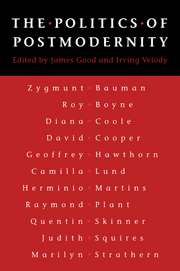1 - Introduction: postmodernity and the political
Published online by Cambridge University Press: 05 June 2012
Summary
Truth was their model as they strove to build
A world of lasting objects to believe in.
W H. Auden, ‘The History of Truth’Every beginning
is only a sequel, after all,
and the book of events
is always open halfway through.
Wislawa Szymborska, ‘Love at First Sight’This volume explores the political possibilities left to those once modernising societies, an exploration that is made not only in terms of the worlds these societies have constructed but also in revealing the novel conditions and possibilities which the closure of modernity entails. That closure, in part the completion of industrialisation and the social order that went with it, and in part the dislocation and decay of the kinds of knowledge used to understand it, has raised profound and disturbing questions about the character of this brave new world and the new ways in which its governance and the goal of the good society can be measured. This crisis, often taken as the central feature of postmodernity, is discussed throughout this volume, which essentially presumes the death of the foundational approach to political analysis and offers a variety of new perspectives to look forward to the postmodern social world.
This collection takes up issues concerned with the debate on the foundations of political thought, with special reference to the work of Richard Rorty, Jean-François Lyotard, Charles Taylor and Alasdair MacIntyre. Inevitably it bears on matters which have been tangential to modernist political themes: issues of gender, ethnicity and ecology, which have become increasingly central to the social organisation of political activities.
- Type
- Chapter
- Information
- The Politics of Postmodernity , pp. 1 - 18Publisher: Cambridge University PressPrint publication year: 1998
- 3
- Cited by



